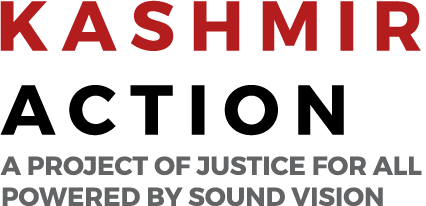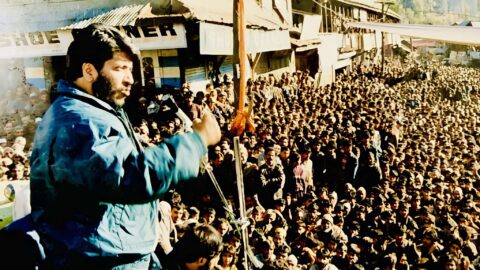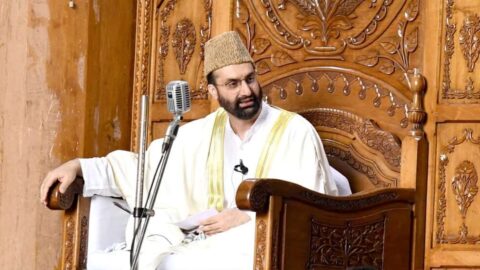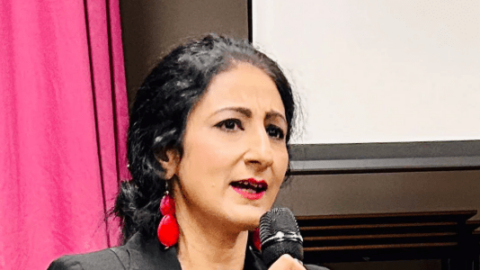SRINAGAR, Kashmir – Shabir Shah, a prominent Kashmiri pro-freedom leader and prisoner in India’s Tihar…
The case of Journalist Asif Sultan
Kashmiri Prisoners of Conscience:
Introduction
- Asif Sultan is a Kashmiri journalist who has been in prison for 1606 days, since his arrest in August 2018 under the Unlawful Activities (Prevention) Act or UAPA, a stringent anti-terror law. In Kashmir, the UAPA has been used to repress all forms of dissent and voice of the people against the ongoing military-occupation. India categorizes as “terrorism” all expressions of struggle for right to self-determination, including non-violent expression. Kashmiri journalists who have been reporting facts from the ground have also become victims of the Act.
- Sultan, 36, is accused of “harboring known pro-freedom fighters” while working as an assistant editor for a Srinagar-based English magazine Kashmir Narrator, a baseless allegation which he rejects.
- The family of Asif Sultan and the editor of the magazine he worked for, reject the state’s narrative, asserting that he was jailed for his journalistic work, especially for a story titled The Rise of Burhan, which he wrote for his magazine in July 2018. The story mapped the life story of a popular pro-freedom commander, who was killed by the Indian state in 2016.
- Asif, though a victim of injustice, is not intimidated by what has happened to him. A photograph of him at the court complex about two years ago went viral, which showed him wearing a T-shirt with the message ‘Journalism is not a crime’. According to Asif, the police station house officer had slapped and abused him for wearing that T-shirt.
- Press freedom in Kashmir appears to have reached an all-time low, as the Indian state shows little consideration for press freedom. There has been an exponential rise in incidents of harassment, intimidation, arrests, and raids, and at least six journalists have been charged with so-called terrorism-related offenses. The allegations are “politically motivated” in order to muzzle ground reporting critical of the state’s human rights violations.
The Detention and the Case
- Asif Sultan was first arrested on August 27, 2018, during a nocturnal raid by Jammu and Kashmir Police and paramilitary forces at his residence in Srinagar. During a midnight raid, police claimed to have discovered “incriminating material” in his possession. His laptop and mobile phone were confiscated as evidence. According to Asif’s editor, in the charge sheet, the police claimed to have sent the laptop and other seized materials for forensic analysis to Chandigarh. But even after more than four years of his detention, the results of the analysis are yet to come[1].
- During the raid, the house of Asif Sultan was ransacked, the family intimidated, and the possessions of even the family of Asif were seized by the police officials.
- In a report published by The Diplomat[2], it was stated that not far from Asif’s house in Batamaloo, a shootout between government forces and pro-freedom fighters had taken place on August 12, a few weeks before Asif’s detention. A policeman had been killed in the gunfight, while three pro-freedom fighters holed up in a civilian house managed to escape. Police filed a case and arrested the house owner. “We arrested the house owner and he led us to a woman based in North Kashmir, who was in touch with several militants and their aides. During questioning, she gave us Asif’s name, following which we took action. We have also recovered a receipt of purchases made in Asif’s name from a house where we believe militants had been sheltered,” one of officials told the reports of The Diplomat.
- Motta, Asif’s editor, however, rebuffed the police’s narrative as “nonsense.” He pertintently questioned that if Asif’s journalistic work and his writings were not the cause for his illegal detention, then why did the police present his Facebook account as prima facie evidence in the application to deny him bail? Why wasn’t the so-called evidence presented instead? “In the application, without specifying any particular post, police have said Asif’s Facebook activity establishes his association with pro-freedom fighters. And he was using it to support their ideology,” the editor stated.
- Sultan’s lawyer Adil Abdullah Pandit, while speaking to AlJazeera maintained that his client was not even present at the site of the gunfight, a fact “admitted by the prosecution”. Pandit describes the police case as “purely fabricated”. He argues that if the police acknowledges that Sultan was not present at the gunfight, “then how can charges of 302 [murder], 307 [attempt to murder] and 326 [voluntarily causing grievous hurt by dangerous weapons] be invoked against my client? These three offenses cannot be made out against Sultan,” Pandit told AlJazeera. Under the UAPA, Pandit stated that Sultan is accused of “harboring terrorists” and conspiring against the state by giving assistance to rebels. “There is no evidence on record which could prove that Asif Sultan has provided any assistance or logistic support to the militants or he harbored any militant,” Pandit added[3].
- The fact that Asif Sultan was arrested for his writings is not an unfounded claim. GV Sundeep Chakravarthi, who has served as the senior superintendent of police in Kashmir’s Kupwara district, was posted in Srinagar when the gunfight occurred. He was the investigating officer in Sultan’s case. Days after Sultan’s arrest, Chakravarthi, while speaking to an Indian news website Scroll.in, stated that the journalist was “writing against uniformed forces”. Thus, revealing the motivation behind his detention[4].
- Days after Asif’s piece on Burhan Wani was published, Motta, Asif’s editor, received an email from “Media cell/CID J&K” (The acronym CID stands for Criminal Investigation Department). The email put forth several questions surrounding the stories and journalistic works done by Asif. The email demanded to know why the magazine chose to publish reports about “militancy”. It also objected to the usage of particular phrases and words in Asif’s piece. The email is another proof that Asif was jailed not because he was involved in a gunfight but because his writings were not to the state’s liking[5].
- On April 5, 2022, a special court of the National Investigation Agency, which oversees terror-related cases, granted Sultan bail in that case, stating outright that the state had miserably failed to provide evidence linking him to any militant organization. However, the state authorities kept Sultan in detention at the Police Station in Batamaloo area of Srinagar, and then re-arrested him under the draconian Public Safety Act (PSA). PSA has called a “lawless law” by Amnesty International, as it allows the state to arbitrarily detain any individual without having to provide any grounds of arrest, and keep them in detention for up to 2 years. The fact that the state had to take recourse to the PSA further evinces the baselessness of state’s “evidence” against him[6].
- On 1st May, Asif was shifted to Agra jail, thousands of miles away from his home.
The Human Cost of Detention and the Family’s Struggles
- Sultan’s daughter, Areeba, was 6 months old when her father was arrested in August 2018. She is almost 5 years old now and has only seen her father handcuffed – dressed as a prisoner. She has only met her father whilst he was in detention. She could only hug him when he was brought for court hearings. Otherwise, she sees his face through the bars.
- Sultan’s wife’s struggles are manifold. She has to raise their little daughter alone, and explain the inexplicable to her daughter, afterall, how do you explain to a child why their father, who has committed no crime, is behind bars?
- The father of Asif Sultan, Muhammad Sultan, has recently undergone heart surgery and has been advised by the doctors to avoid strenuous activities. In ordinary circumstances, this would have posed no problem. Asif would have looked after his father, ensured that he’s taken care of well. But Asif is miles away from his home, in detention. Muhammad Sultan has to tend to himself, but also tend to the family overall[7].
International Condemnation of Asif’s Detention and Calls for Release
- The Committee to Protect Journalists (CPJ), an independent non-profit, non-governmental organization based in New York, penned a letter to Prime Minister Narendra Modi on August 27, 2020, exactly two years after Asif Sultan was illegally detained, demanding his immediate and unconditional release. The letter was signed by 397 journalists and members of civil society, including N. Ram, Karan Thapar, Mani Shankar Aiyer, Harsh Mander and Meenal Baghel[8].
- Asif has won several awards for his work from various international journalist bodies. In 2019, he was awarded the annual John Aubuchon Press Freedom Award from the US’s National Press Club. At the awards ceremony in Washington DC, the National Press Club stated that the Press Freedom Award that year was going “to a journalist in Kashmir jailed for nearly a year for his reporting”. Therefore, the state’s narrative on Asif’s involvement in “terrorism” was globally rebuffed[9].
- Asif’s case was also featured in TIME magazine’s May 2019 edition as one of the ten most urgent cases which pose a threat to freedom of journalism and press around the world[10].
Violation of International Law
- Journalists in Kashmir have been victims of oppression for a long time. They are regularly called to police stations and interrogated about their reports and their sources of information. India is a party to all four Geneva Conventions and incorporated the Geneva Convention Act of 1960 into its domestic legal framework, therefore, civilian journalists are bound to be protected as long as they do not take part in any direct hostility or act of violence. They are not to be harassed about their sources of information and for their reporting of the conflict.
- According to Rule 34 of the study on Customary International Humanitarian Law, civilian journalists who are working in areas of armed conflict must be protected as long as they are not taking a direct part in hostility. This protection remains almost the same in international and non-international armed conflict.
- Resolutions have been instituted in U.N to prevent acts of violence against journalists in conflict zones like Kashmir, including UNESCO Resolution 29 (1997), U.N. Security Council Resolution 1738 (2006), the Medellin Declaration, (May 4, 2007) and the Declaration on the Safety of Journalists (2009). The resolutions strongly criticize attacks and intimidations of journalists in conflict zones and urge states to investigate all acts of violence in which journalists are victimized, release detained journalists and sign and ratify the Additional Protocols I and II of the Geneva Conventions and Rome Statute of the International Criminal Court (ICC).
[3] https://www.newsclick.in/Jail-Since-Four-Years-Journalist-Asif-Sultan-Booked-Under-PSA-Bail
[5] https://thewire.in/media/kashmir-journalist-aasif-sultan-1000-days-jailed
[10] https://time.com/5873991/threats-press-freedom-august-2020/




